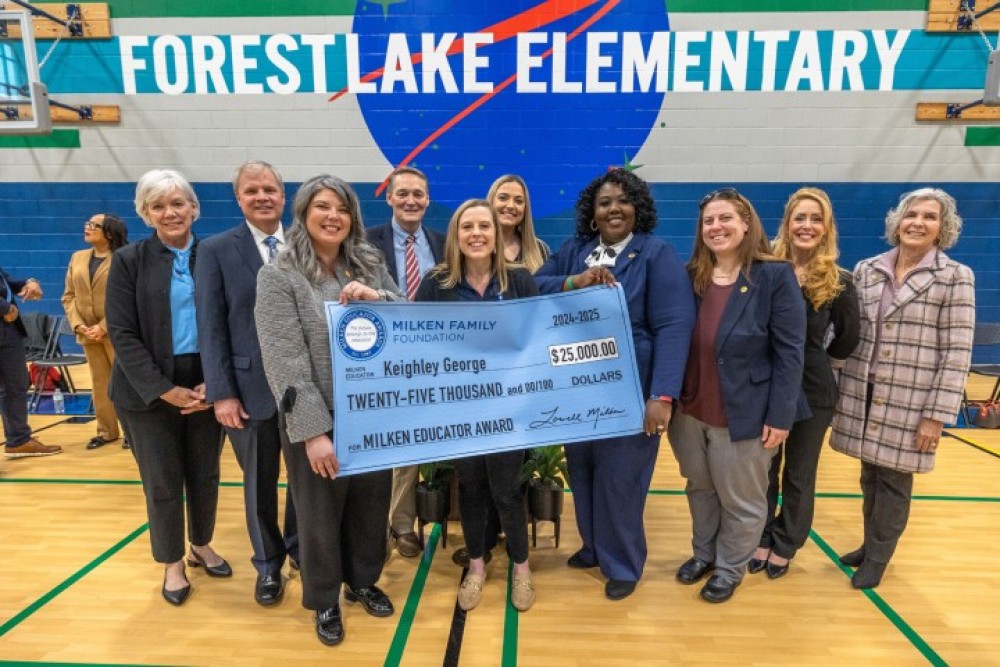Spotlight: Keighley George (SC '24)
September 8, 2025
South Carolina Milken Educator Keighley George (SC ‘24) is a kindergarten through fifth grade lead interventionist at Forest Lake Elementary School. With a growth mindset, George fosters meaningful connections with students, parents and educators. Her leadership extends beyond the classroom, impacting her district and state through professional development and advocacy for student success. George received her Milken Educator Award on February 20, 2025.
Milken Family Foundation: How did you feel at your Milken Educator Award notification?
The Milken Educator Award notification was a surreal and unforgettable experience. When my name was called, I was truly shocked! I will also never forget the memorable moment of calling my husband to tell him about receiving the Award. He has always been my sounding board and biggest supporter.Hearing his reaction and watching the video of the call still brings me to tears!
MFF: How did students respond to your Milken Award?
My students were incredibly encouraging, supportive and proud. It was so much fun to share the excitement with my RTI team and the amazing colleagues I work with each day. I also heard from many former students, parents and colleagues. Their cards, emails, hugs and letters brought me so much joy. Their kindness made me reflect on the lasting impact one person can have on others. A funny moment that stood out to me was the week after the Award, when I was pulling a new and nervous fifth grader for testing. One of my students reassured her by saying, “Don’t worry, she is a really good teacher! She is famous!”
MFF: What made you want to pursue a career in education?
I grew up in a family that valued education. My mom and grandmother were both educators, so I was surrounded by that influence from a young age. I became a teacher because I believe in the impact educators can have, not just in the classroom but in the broader community. Teachers help shape students into confident, capable people who contribute to society in meaningful ways.
MFF: How do you use personalized goal-setting to empower students in their academic growth?
I use personalized goal-setting to build student agency and ownership of learning. My students set meaningful goals and work towards them. These goals help them see the value of productive struggle. I strive to balance what they already know with just the right level of challenge to foster growth. I set clear goals for my students so they can enter each lesson with confidence. They know what is expected and what they are working towards. My classroom is also a safe space where mistakes are seen as opportunities, because that is where the deepest learning happens. My students know it is okay to fail, reflect and try again.
MFF: What key changes did you implement when revamping the RTI program, and how have those changes impacted students and teachers?
My mission as an educator is to improve literacy outcomes for all students. We have revamped our RTI program by focusing on equipping teachers to quickly diagnose reading needs and implement evidence-based strategies. In K-2, we have prioritized explicit, systematic phonics instruction to build accuracy and fluency. These changes have given teachers a clear framework and provided students with targeted support that strengthens both their reading skills and overall confidence. We have made a lot of progress, but there is still more work to be done!
MFF: What does “success” look like for you and your students in life?
Success for me means ensuring every student in my school becomes a successful reader. It is about being honest about the challenges they face and working quickly to provide solutions so all students receive a high-quality educational experience. For my students, success is the moment they believe in themselves. The moment they take risks, push through challenges and take ownership of their learning. It is the moment they become confident and capable readers.
MFF: Who are your role models in education?
One of my professional role models is MTSS Specialist Stephanie Stollar. As a reading interventionist, I am guided by her statement, “We know too much to be failing so many.” My mission is to improve literacy outcomes for all students. In my school, I strive to push the needle and act with urgency around reading instruction because I know it can change the trajectory of a student’s life.
I have also been inspired by several “marigolds” throughout my career. I have had so many mentors who have believed in me and poured into me to help me become a more effective educator. My former principal, Eddie Marshall, and current principal, Benjamin Jackson, have helped me develop as a leader. They both believe in me and have always pushed me to the next step. They model a leadership style rooted in compassion, humility and kindness. Instructionally, my former district literacy coach Kathy Lapomarda and state literacy coach Stephanie Maddox helped me during my second year teaching. They saw something in me that I did not see in myself. They helped me to begin my journey with structured literacy and provided the support I needed to meet the diverse needs of my students.
MFF: How do you hope to be remembered by your students?
I hope my students will remember me as an advocate for them. An educator who met them where they were, regardless of their level or challenges, and helped them move forward. I hope they remember me as an adult who loved them and worked to provide high-quality instruction and support so they could achieve their hopes and dreams in life.
Don’t miss any new articles and updates from Milken Educator Awards:


